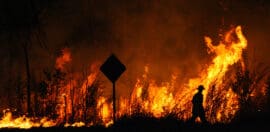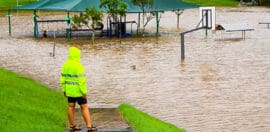The federal government urged to steer clear of a gas-fired coronavirus recovery

24 June 2020 at 4:56 pm
Community leaders say gas is a very unstable foundation on which to rebuild an economy
Australia needs a renewable energy powered recovery from COVID-19 and must not turn to investing in gas, Oxfam warns.
The charity has released a briefing paper that said attempting a gas-fired economic recovery will entrench the same problems as coal, such as high energy costs, climate damage and pollution, land rights violations, and wealth concentration.
It comes after leaked documents from the National COVID-19 Coordination Commission showed the government has been urged to underwrite a huge expansion of the nation’s gas industry.
Oxfam Australia CEO Lyn Morgain said gas was a very unstable foundation on which to rebuild an economy and build a better future.
“This year, we have seen that no-one is immune to the climate crisis, including here in Australia,” Morgain said.
“But it is people living in poverty who are paying the greatest cost, despite having contributed the least to global climate pollution.
“Relying on a gas-fired recovery from COVID-19 risks failing not only to meet immediate needs but also imposing a crippling burden on future generations – in the form of climate damage, stranded assets, fewer jobs and big debts.”
The briefing paper said the government should use the fallout of COVID-19 to create a meaningful national framework for action on climate change, including cutting emissions.
“As a potential clean energy super-power, with unparalleled resources in solar and wind energy, Australia is uniquely placed to help drive the global transition to a clean energy future: a future of greater resilience, of new jobs and industries, and in which prosperity can be shared more equally,” the report said.
The bushfire crisis put the issue of climate change firmly in the national spotlight earlier this year, and Morgain believes this agitation for change remains despite the ongoing pandemic.
She told Pro Bono News that this was a defining generational issue.
“If anything, COVID has added to the Australian community’s view that we need to prioritise what matters and we need to look after the health and wellbeing of our community over time,” she said.
“That is about the economy we want to build, but it also squarely concerns protecting the environment for future generations.
Morgain added that the not-for-profit sector had a vital part to play in facilitating change in this area.
“The sector has a very important role, particularly because trust is diminishing in other areas. It’s critical that charities are there to represent the contribution of hundreds of thousands of individual Australians who want things to be better than they are,” she said.
There are also fears that an expansion of Australia’s gas industry would disproportionately hurt Aboriginal communities, particularly in the Northern Territory where fracking could occur.
Amelia Telford, a Bundjalung woman who is national director of the Seed Indigenous Youth Climate Network, said many Aboriginal communities were concerned about the long-term damage that fracking could cause to water, to country, and to songlines.
“These communities are already feeling the impacts of a warming climate, fracking would only make this worse and could force many people to move off country,” Telford said.
“Time and time again, governments and mining companies have ignored concerns from Traditional Owners and Aboriginal communities who are worried about fracking and the impacts of exploration licences that have been granted without proper free, prior and informed consent.”
Oxfam is calling on the government to prioritise Indigenous-led climate solutions, commit to a national goal of zero emissions well before mid-century, and phase out fossil fuels in the nation’s domestic energy system and exports by 2030.








I would prefer Pro Bono to be A political rather than publishing this kind of story that denies reality.